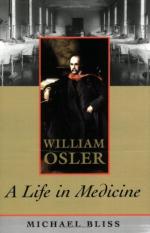|
This section contains 363 words (approx. 2 pages at 300 words per page) |
Encyclopedia of World Biography on William Osler, Sir
The Canadian physician Sir William Osler (1849-1919) was outstanding in the principles and practice of medicine, contributed writings of classical quality, and collected an impressive library on the history of medicine.
William Osler was born in Tecumseh, Ontario, on July 12, 1849. His father was a clergyman, so his upbringing was in a religious atmosphere. The influence of Thomas Huxley and Charles Darwin, however, turned him toward agnosticism in his days at Trinity College, Toronto. He studied to be a doctor, first at the Toronto School of Medicine and then at McGill University, where he graduated in 1872. Further studies were at University College, London, and at medical centers in Berlin and Vienna. After returning to Canada he accepted the chair of physiology and pathology at McGill, where he continued research in pathology, working on freshwater polyzoa and parasites; he studied hog cholera in 1878-1880.
Osler held the chair of clinical medicine at the University of Pennsylvania from 1884 to 1889, when he went to Baltimore as professor of the principles and practice of medicine and as physician-in-chief at the university hospital. There he joined William H. Welch, William Halsted, and Howard Kelly to form a brilliant medical team sometimes called the "Big Four" of Johns Hopkins. In 1905 Osler was appointed regius professor of medicine at Oxford University, England. However, he remained in constant demand at home and abroad for lectures. The classical flavor of his speech and writing, combined with its wit and insight, has hardly been equaled among medical scholars. He also collected an unusual medical history library of rare books. His library room was transported and restored at the McGill Medical School in Montreal to preserve intact his valuable collection.
Many distinctions and honors came Osler's way, including a baronetcy in 1911. His humanitarianism was exemplified by his criticism of war, which took the life of his only child, Revere, in 1917. Osler died at Oxford on Dec. 29, 1919.
Osler's books include Principles and Practice of Medicine (1892), an inimitable textbook for many years because of its thoroughness, style, bits of wisdom, and human touches. It went through numerous editions and was printed in 4 languages. Other significant works were Science and Immortality (1904) and A Way of Life (1914).
|
This section contains 363 words (approx. 2 pages at 300 words per page) |


